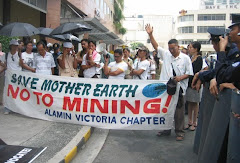Furious about Environmental Authorisation on Mindoro

NEWS REPORT FROM FRANTIDEN I VARE HENDER OF OSLO, ENGLISH TRANSLATION
Intex Resources has received environmental authorisation for its nickel project on Mindoro. The central authorities on the Philippines have thereby run over the local authorities, which are strongly opposed to the mining project. A large-scale hunger strike is now planned to be staged in front of the Department of Environment and Natural Resources.
By Pia A. Gaarder
Norwatch
Published in English 4 november 2009
On 14 October the Secretary of the Environment and Mining, Jose L. Atienza, signed the environmental authorisation – Environmental Compliance Certificate (ECC) – for Intex Resources’ nickel project on the Philippines.
– We are very pleased that this long and thorough process has finally led to the issuance of the ECC for Mindoro Nickel by Secretary Atienza. One of the most important milestones for this project has now been achieved, Erlend Grimstad, CEO of the Norwegian company Intex Resources wrote in a press release.
But not everyone is as happy as Intex’s leader. On the contrary. The whole project has met with strong opposition from the provincial governors of Mindoro, great part of the local population, the church, and NGOs. There are strong indications that this resistance will now be escalated.
The organisation Alamin has given notice of an extensive hunger strike starting on 17November. The demonstration will take place in front of the Department of Environment and Natural Resources in the former capital, Quezon City, where several government buildings are located. The goal is to force the government to withdraw the environmental authorisation. In practice, the environmental authorisation constitutes the starting point for the interventions in the area.
OECD Complaint
The environmental authorisation for the nickel project was issued before final hearing of the complaint against Intex Resources which The Future in Our Hands has sent to the national contact point for the OECD’s guidelines for multinational companies. The authorisation has thus been issued before the new evaluation of the case, which, from what Norwatch has learned, Norway’s new ambassador in Manila, Knut Solem, will carry out as a part of the appeal.
In October of 2007 Norway’s ambassador to the Philippines at that time, Torstein Ståle Risa, visited the island of Mindoro. Intex Resources, which was then called Crew Minerals, was already in the process of carrying out test drills. The goal of Risa’s visit was, among other things, to examine how the local population felt about Norway’s gigantic plans. The trip came about after the Norwegian Broadcasting System’s TV News, in collaboration with Norwatch, raised the issue on 23 September that year. It was of special concern that the local population’s leaders had signed the contract with their fingerprints and that the indigenous population had been tricked with a little rice. Risa was able to confirm, among other things, the great local opposition to the project.
Moratorium Overturned
In 2002 the province of Mindoro instituted a 25-year moratorium against any form of mining operation on the island, and Intex’s test drills for nickel were thus at variance with the local legislation. But the central authorities did not endorse the province’s resolution.
Food security and possible great environmental damage are the main reasons for the local authorities’ opposition to the open-cut nickel mine. The concession area for the mining operations is located in an environmentally vulnerable area, with a watershed that is important for four large rivers. These supply water for 70% of the provinces’ rice fields and fruit plantations. Pollution of these rivers would affect farmers in the lowlands. Local politicians are therefore extremely concerned about the long-term effects on agricultural areas and food production on Mindoro. The possible mining area overlaps in addition the area of the Mangyan indigenous population, where the Alangan and Tadyawan tribes are most strongly affected.
– Mining operations in watersheds is prohibited according to Philippine legislation. If we get large-scale mining operations in this area, it will intensify the flooding problem in our province. It will create great problems for our population and for the important agricultural areas here, Governor Arnan Panaligan told us when Norwatch visited the area in the summer of 2007.
Mindoro is known as “Manila’s food supplier”, and large floods have previously destroyed entire crops on the island.
Intex Resources believes that everything in the process up until the environmental authorisation has proceeded correctly:
– This process has taken over a year, and has consisted of baseline studies identifying all background values for flora, fauna, water and air. A series of public hearings and consultations have also been held to give all stakeholders an opportunity to discuss and air concerns and opinions. All of these inputs have been evaluated, Intex wrote in its press release.
But the opponents are furious and believe that short-term financial interests have now endangered the environment and food security. And Governor Arnan Panaligan is still just as greatly opposed as earlier:
“The environmental authorisation was granted in gross disregard to the strong and categorical opposition of the leaders and people of Mindoro to the nickel project. The Department of the Environment and Mining, in granting the ECC, placed the long term safety of the fragile environment of Mindoro Island in serious danger. Apparently the DENR has not learned from previous environmental catastrophes,” Governor Panaligan said, according to a press release from the organisation Alamin (Alyansa Tigil Mina).
FACTS
Intex Resources was previously been called Crew Minerals, Aglubang Mining Corporation, and Mindex. The last name change occurred in December of 2007. Norwatch has followed up the company ever since it was named Mindex.








Post a Comment